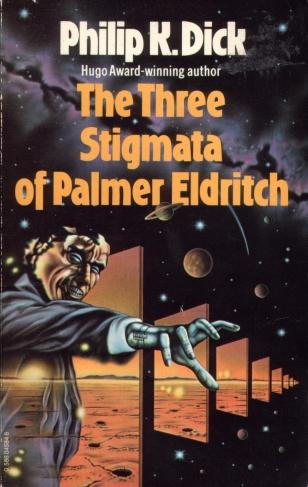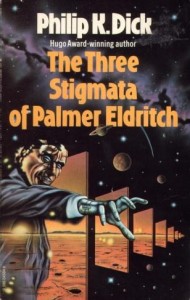Philip K. Dick (1928-1982) wrote some of the more intriguing science fiction of the latter half of the twentieth century. He was a prolific writer. He won the Hugo Award for The Man in the High Castle (1962) an alternate history tale in which the Axis won the Second World War and conquered the United States, and the John W., Campbell Memorial Award for Flow My Tears the Policeman Said (1974). His 1968 tale, Do Androids Dream of Electronic Sheep? was turned into one of the best science films, Blade Runner. Amongt his best work, perhaps, is The Three Stigmata of Palmer Eldritch (1964). It is set in the future when the earth has become unbearably hot and the United Nations, which seems to have evolved into a world government, conscripts people to settle other planets and moons within the solar system so that mankind can survive should things become even worse on earth. The planets and moons are pretty inhospitable to human life, so many of the colonists take an illegal hallucinogenic drug to escape their misery. Leo Bulero manufactures and distributes the drug and has become wealthy enough to pay to go through a process of induced evolution. Most of these people (including Bulero) evolve to a higher human state, but some devolve. There are also so called precogs, those humans able to foretell the future (with probability, though, not with certainty) Adventurer Palmer Eldritch has made the ten year journey to the nearest star system containing intelligent life, Proxima, and has returned with an even more powerful hallucinogen, this one approved by the U.N. But what are his motivations?
For a large part of the book we witness these hallucinogenic experiences and it is often unclear what is real and what is fantasy. Eventually, though, the story becomes one of human-alien encounter and even of cosmic striving, hubris, and loneliness. Dick was an able writer with a fertile imagination. Despite the fantastic nature of his plots, he was deeply concerned with the human condition. I do not think his fiction (at least what I have read of it) provides a guide, but it can spur reflection as well as entertain which is no mean achievement.



“The Three Stigmata of Palmer Eldritch” was written during a tense period in his writing career.I think he was able to realise all his emotional frustrations through the writing of this weird,paroxsymal novel.
[…] The Three Stigmata of Palmer Eldritch by Philip K. Dick […]